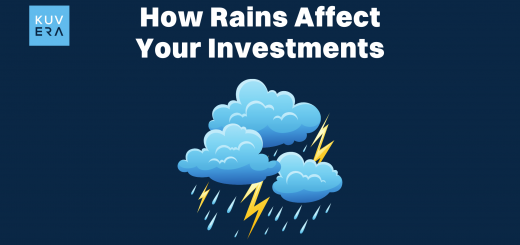Starting anything can be hard. But starting financial planning can be especially harder because of the risk involved. We can all agree that the lack of financial education in schools and colleges did not make the matter any easier. On top of that, all the financial terms & jargon can be overwhelming for beginners.
Today we are making it easier for you. Here are 14 commonly used financial terms that you might come across if you are just getting started on your personal finance & investing journey.
1. Compounding
The most important personal finance term is compounding. When you invest your money, you are expected to earn a return on your investment. Through compounding, this return gets reinvested and generates even more returns. This means that the value of your initial investment keeps on increasing as time goes and you keep earning more and more interest.
For example, you invested ₹1000 and earned a ₹100 return in the first year. Due to compounding, the next year your principal amount will be ₹1100 and you will get returns on this amount. In the long term, your investment will grow exponentially.
This is why it is so important to start your investments early. The more time you give to your investments, the more return they will give you.
To understand this in more detail, read this.
2. Inflation
Inflation refers to the general increase in the prices of goods and services in the economy. This means that the purchasing power of money decreases. For example, if you buy a bag for ₹1000 today then due to inflation, the price of that bag will increase and you might have to spend ₹1100 for the same bag.
Inflation is one of the main reasons why investing is preferred over savings. Because unless you increase the value of your money by investing, you will lose your money to inflation.
To know more about inflation and how it affects your finances, watch this video.
3. Time value of money
Time value of money is a financial concept that states that the value of money is more today than it will be in the future. This is because a particular amount of money has the power to generate more money through investment today.
This means if someone offers you to choose between ₹1000 today or the same ₹1000 after 2 years, then you will choose to take the money now. This is because ₹1000 now can be used to generate more money through investment within the next 2 years. So, the value of money is more now.
Click here to know how you can invest ₹1000 in the most efficient manner.
4. Credit Score
A credit score is a number that indicates the ability of a person to pay back a loan. Banks & financial institutions give you loans based on this score. In India CIBIL (Credit Information Bureau India Limited) is one of the 4 companies that are licensed by the RBI to issue credit scores. The credit score provided by CIBIL is the most popularly accepted credit score in India by all financial institutions.
5. Stocks
Simply put, stocks are investments in a company. When you buy a stock you are purchasing a very small part of the company called a share. When the value of the company increases, the value of the stock also increases, and then you can sell it at a higher price to get a profit. The company collects funds from the public and the public gets a chance to make a profit.
6. Bonds
Bonds are a type of security. In this, a corporate or government entity issues a bond as they lend money to the borrower. These documents include all the important terms like the date of repayment, interest rate, etc of the loan and its repayment. Click here to read about how bonds work.
7. Mutual Funds
Mutual Fund is a professionally managed pool of investment. Here, the money is collected from a bunch of investors with common investment objectives and then invested into various securities like stocks, bonds, etc. There are various categories of mutual fund schemes according to diverse investment goals.
The main objective of a mutual fund is to diversify the investment in multiple places and decrease the chances of a major loss for investors. It is also beneficial because the investments are handled by a professional investment manager rather than by an amateur.
It is one of the most popular forms of investment, especially for people who are beginners to investing. Here are a few mutual fund-related terms that you should know if you want to start investing in it.
8. Equity
Equity is the amount of capital that is invested in the company by the shareholders or owners( for private companies). Simply put, it is the shareholder’s stake in the company.
9. Risk Assessment
Risk assessment is a process through which you determine the risk of loss for a particular investment. It is important for all financial decision-making because it helps you make an informed financial decision. There are two types of risk assessment, one is qualitative where past behaviors and personal judgment is used to assess the risk. This type of analysis is subjective. The second is quantitative, where mathematical formulas and theorems are used to assess risks. In general, an investment with a higher return is riskier than an investment with a lesser return.
10. Asset Allocation
The process of deciding where to invest your money to get the maximum return at minimum risk is called asset allocation. In simple words, when you invest in a variety of assets to get maximum returns at minimum risk.
Read this to understand how this works.
11. Demat Account
If you plan to invest in the share market, then demat or dematerialization account is a mandatory account that you need to open to be able to hold various investments like listed shares, listed government securities, etc.
This is a digital account where all your investment-related documents are organized and maintained. This was done to avoid the hefty paperwork that was previously required to operate and trade in the market.
12. Overdraft
When you withdraw or transfer more money than what is present in your account, it is called an overdraft. It is a type of a loan since you don’t have the money in your account and you are borrowing money from the bank. There is an interest charged for this as you would find in your normal loan.
There are two types of overdrafts, one is an unplanned overdraft where you withdraw more money that is present in your account on accident while the other is a planned overdraft, where the overdraft is agreed upon and arranged with the bank in advance.
Read this to understand the difference between a loan and arranged overdraft.
13. Portfolio
A portfolio shows all the investment that has been made by a particular investor. It is a collection of all kinds of investments like stocks, mutual funds, bonds, etc that one has decided to invest in. A portfolio can have all forms of investments like land, properties, art, etc.
14. Emergency Fund
One of the most common terms you will come across while getting started on personal finance management is an emergency fund. An emergency fund as the name suggests is a fund that you keep aside from your savings to finance any emergency expenditure that might occur.
This is done to avoid dipping into the investment money and losing the benefit of compounding in case of emergencies. The amount for an emergency fund is flexible but generally, you should have an emergency fund of 3 to 6 months of your salary.
Interested in how we think about the markets?
Read more: Zen And The Art Of Investing
Watch here: Investing in focussed mutual funds
Start investing through a platform that brings goal planning and investing to your fingertips. Visit kuvera.in to discover Direct Plans and Fixed Deposits and start investing today. #MutualFundSahiHai #KuveraSabseSahiHai











